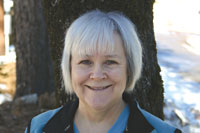

|

|
|
2011 Highlights: UC IPM Annual Report History-making advisor retiresby Pam Kan–Rice, assistant director, News and Information Outreach Carolyn Pickel, UC Cooperative Extension’s first woman farm advisor, retired from the university on June 20 after 38 years. Pickel, who was the integrated pest management advisor for the Sacramento Valley, joined UC Cooperative Extension in 1977 as a farm advisor intern, after four years as a UC staff research assistant. In 1979, she was promoted to UC IPM area advisor for the Central Coast, working on a variety of crops, including strawberries, brussels sprouts and apples. In 1990, she moved north to work with Sacramento Valley growers in Sutter, Yuba, Tehama, Glenn, Butte, Colusa and Yolo counties, to develop IPM practices for growing walnuts, almonds, prunes and peaches. Don O’Dell, a Chico walnut grower, praised Pickel for scientifically evaluating the IPM techniques’ effectiveness on a regular farm, not just in a laboratory environment. “She’s really been helpful to industry and been beneficial to society in the long term,” he said. O’Dell has worked with Pickel over the years testing pheromone mating-disruption techniques to control codling moth, the number one walnut pest. In recent years, she has been experimenting with puffer devices, which fill the tree canopy with pheromones so the male codling moths get confused and can’t find the females to mate. “People will look back and see that was key to controlling codling moth,” O’Dell said, explaining that reducing the numbers of codling moths with mating disruption has reduced growers’ dependence on organophosphate and pyrethroids. “If it works well, we don’t have to spray.” Although her maternal grandfather had a 100,000-acre cattle ranch, Pickel didn’t grow up on a ranch but spent summers there. She was raised in New Mexico, where her father was Santa Fe’s only general practitioner physician. Pickel chose a major that didn’t require her to dissect squirrels. She did not mind dissecting cockroaches and earned her bachelor’s and master’s degrees in entomology from UC Berkeley in 1973 and 1976, respectively. For her master’s degree, Pickel developed the codling moth degree-day model that shaped her future career. “UC Cooperative Extension specialist Clancy Davis hired me to teach farm advisors to use the degree-day model,” Pickel recalled. “That’s when I decided that’s what I wanted to do. I went into Extension because I wanted to work on the practical end of research, making it useful to people.” But when she graduated in 1976, there were no women advisors for agriculture. The women advisors worked in home economics and 4-H. She applied for 13 UC Cooperative Extension jobs before getting hired. “They said I didn’t have enough experience, and Jerry Siebert, UC Cooperative Extension director, told me to write a proposal to hire interns,” she said. Pickel’s proposal initiated UC’s farm advisor intern program, which has since been discontinued. “Internships would be a way to help women and men become more successful as farm advisors, and we were very well trained when we came into these positions.” Many women have followed Pickel, serving as UC Cooperative Extension farm advisors. “Carolyn always impressed me with her hard work, dedication to her field and her very creative thinking,” said Mark Cady, environmental scientist for the Central Valley Regional Water Quality Control Board. “Carolyn was instrumental in producing grower-friendly outreach materials, particularly the seasonal guides to almond pest management and prune pest management.” He noted the popularity of UC’s tree fruit pest identification and monitoring cards, which were her idea. “These are simple to keep in a glove box and are packed with information about each pest and beneficial.” The cards, which identify each insect with a description and close-up color photographs of important life stages, are now on their third printing and inspired pest cards for landscapes and other crops. “Carolyn was one of the first advisors to see the value in broad collaborations that put farmer-to-farmer information sharing in the mix of outreach tools,” said Cady, who worked with Pickel on the walnut Pest Management Alliance project when he was deputy director for Biological Farming Programs at the Community Alliance with Family Farmers. “Early on, Carolyn recognized that the environmental outcomes of farming practices had to be considered alongside economic returns and crop productivity,” Cady said. Her research has persuaded prune growers to apply dormant sprays earlier in the fall, when the ground is drier so the pesticides stay on the ground, rather than getting transported offsite by rain. Pickel has won several awards, including the IPM Foundation Team Award from the National Entomology Society of America, California Department of Pesticide Regulation’s IPM Innovators Award for authoring the Seasonal Guide for Environmentally Responsible Pest Management based on research conducted with the Almond Pest Management Alliance, and the IPM Team Award from the Pacific Branch of the Entomology Society of America, all in 2008. In retirement, Pickel and her husband, Marty O’Connell, have moved to McCloud, an old historic mill town near Mount Shasta in Siskiyou County. “Where the air is clear, the sky is blue and there’s no traffic,” she said. UC has granted her emeritus status so Pickel also intends to continue her research and demonstration of puffers for walnut growers, and author the insect chapter for the UC walnut production manual. > Next article: UC IPM, NRCS named innovators |